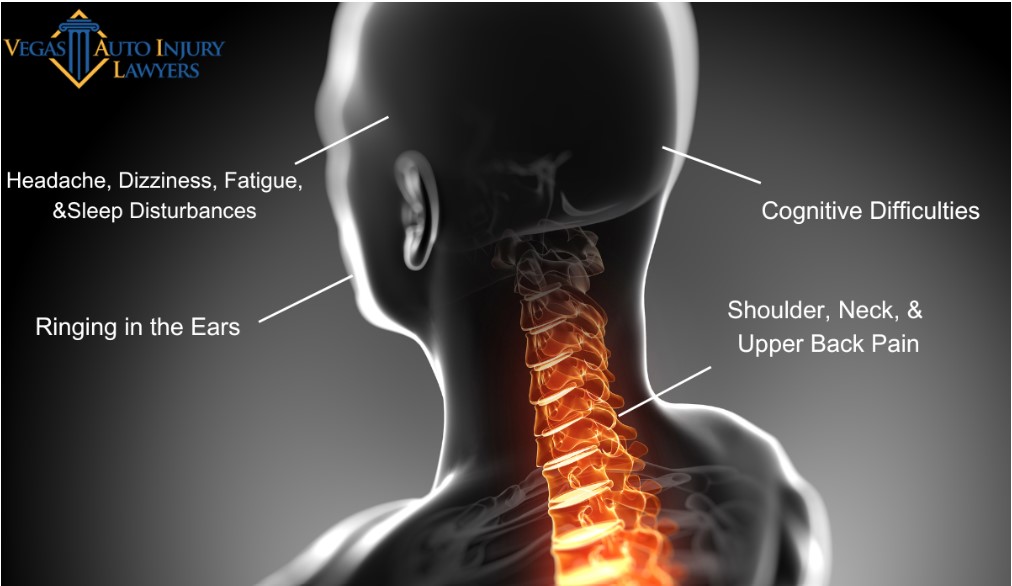DISCLAIMER: In the event of a car accident, call 911 immediately if you or someone else may be injured. Seek professional medical advice for proper diagnosis and treatment.
Car accidents can result in a range of injuries, including whiplash and head injuries. In fact, according to the Annual Trauma Registry Report by the Nevada Department of Health and Human Services, detailing car accident head injury statistics in 2020, approximately 20.8% of all recorded traumatic brain injuries in Clark County were attributed to motor vehicle traffic incidents – 19,891 total motor vehicle accidents occurring in 2022 alone, according to the Las Vegas Metropolitan Police.
It’s essential to recognize the symptoms and understand how to treat head injuries after a car accident to ensure a smooth recovery.
Today, the experienced personal injury lawyers at Vegas Auto Injury Lawyers explore common symptoms of whiplash and head injuries and explore necessary steps toward healing these injuries after they happen.
If you have been involved in a car accident or need to think that it would be in your best interest to speak to a Las Vegas car accident attorney, keep reading to see how a free consultation with Vegas Auto Injury Lawyers can help.
Car Accident Head Injuries
When your head hits the window, steering wheel, or airbag during a car accident, it is important to understand the symptoms associated with your injuries and to seek immediate medical attention to make sure you receive the proper treatment. The most common severe head injuries that occur after a car accident are:
- Concussion: A common head injury that happens when your brain gets shaken inside your head. It can cause symptoms like headache, dizziness, confusion, memory problems, nausea, and sensitivity to light or noise.
- Skull fracture: When your head gets hit hard, it can break or crack your skull. This is a serious injury that needs immediate medical attention to avoid complications.
- Head laceration: If you get a cut or wound on your head during a car accident, it may need medical attention to stop bleeding and prevent infection.
- Traumatic brain injury (TBI): When your head gets severely hit, it can cause a TBI. It can range from a mild concussion to a more severe injury that affects your thinking, physical abilities, and emotions in the long term. Proper medical care is essential for TBI recovery.

Signs and Symptoms of Whiplash
Most of the time, the above injuries are paired with whiplash, especially those that occur during a rear-end collision. Whiplash is a type of neck injury that occurs when the head is suddenly jerked backward and then forward, causing the neck to whip back and forth. It is particularly common in rear-end collisions. The main symptom of whiplash is neck pain and stiffness, which become worse with movement. This pain can also extend to the shoulders and upper back, a term called “referred pain”.
In addition to neck pain and stiffness, whiplash can cause a range of symptoms that may be delayed after a car accident. These symptoms include:
- Dizziness: Feeling lightheaded or having a sense of unsteadiness.
- Fatigue: Experiencing extreme tiredness or a lack of energy.
- Shoulder and upper back pain: Discomfort and pain in the shoulders, upper back, or between the shoulder blades.
- Tingling or numbness: Sensations of pins and needles or numbness in the arms or hands.
- Cognitive difficulties: Problems with concentration, memory, or experiencing brain fog.
- Sleep disturbances: Difficulty falling asleep, staying asleep, or disrupted sleep patterns.
- Headache: Persistent or recurring headaches, often originating from the base of the skull.
- Ringing in the ears: Hearing a persistent noise or ringing sound in the ears.
Whiplash Injury Treatments
DISCLAIMER: The information provided in this blog is for informational purposes only and is not intended to diagnose or treat any injuries. It is crucial to seek professional medical advice and assistance if you have been involved in a car accident or require medical attention.
Recovering from whiplash requires appropriate care and management of symptoms. Limiting physical activities that worsen symptoms is essential to prevent further strain on the neck. Depending on the severity of your car accident injury, using a neck brace or collar may be recommended to provide support and stability. Applying cold or heat therapy can help reduce pain and inflammation.
- Gentle neck exercises and stretches can promote flexibility and strengthen neck muscles. In your day to day life, maintaining good posture is crucial to minimize strain on the neck.
- Massage therapy for whiplash is an easy at-home or professional treatment that can help alleviate symptoms. Massage techniques used for whiplash include Swedish massage, deep tissue, trigger point therapy, or stretching and range of motion exercises to improve mobility and flexibility.
- Another easily accessible at-home treatment for whiplash after an accident is alternating hot and cold treatment. Cold packs can help reduce inflammation, numb pain, and decrease swelling. Heat can relax muscles, increase blood circulation, and promote healing.
- Over-the-counter pain relievers may also offer temporary pain relief, but only when taken in the proper doses per the labeled instructions.
- Ensuring adequate sleep and using a supportive pillow may also provide some relief during the recovery process.
Keep in mind that these symptoms may not show up right after the accident but can show up later on. It is very important not to ignore any unusual signs or discomfort. Your health and well-being should be a top priority, so don’t hesitate to seek medical attention.
How Vegas Auto Injury Lawyers Can Help
Navigating the legal aspects of a car accident and seeking compensation for whiplash or head injuries can be complex. An experienced attorney can provide valuable assistance throughout the process. If you have a head injury after a car accident in Las Vegas, let a personal injury lawyer assist you. Located 20 minutes from historic downtown, we are here to help you after a car accident by assessing your case, gathering evidence, communicating with insurance companies, determining fault, calculating the full extent of your damages including medical expenses and lost wages, negotiate a fair settlement with the insurance company, represent you in court if a settlement cannot be reached, and offer superior legal guidance and support in your time of need.
Reach out to Vegas Auto Injury Lawyers today and take the next big step toward recovery after your car accident injury.


